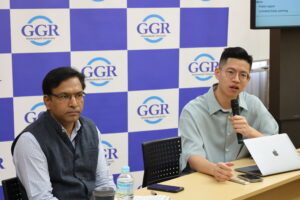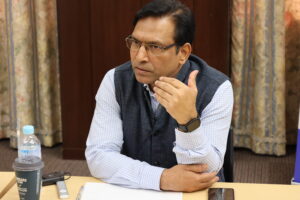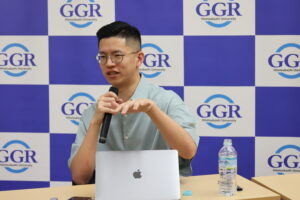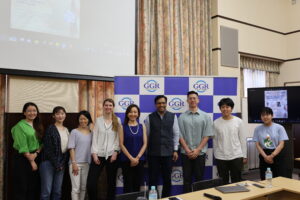On May 24, 2024, the Institute for Global Governance Research (GGR), Hitotsubashi University, hosted the 27th GGR Brown Bag Lunch Seminar “Asia in Turmoil with Disinformation: The Cases of India and Taiwan.” The seminar featured two prominent experts in the field: Chihhao Yu, co-director at the Information Environment Research Center (IORG), a Taiwanese civil society research organization that analyzes the Mandarin information environment, and Dr. Niranjan Sahoo, a Senior Fellow at Observer Research Foundation, a leading think tank in New Delhi. Both speakers provided evidence to explain the consequences of disinformation in their countries’ electoral and democratic processes.
Mr. Yu presented the case for Taiwanese information influence and disinformation operations. By monitoring Social Media Networks (SNS) in the Mandarin language, the IORG follows activity by both domestic and international actors. The speaker explained that disinformation is most dangerous in democracies with direct participation mechanisms. Their research shows a clear interest from the People’s Republic of China (PRC) to manipulate the Taiwanese information environment, but also to complement different forms of threats – for example, by spreading fear within Taiwan while conducting military drills around the Island.
Beijing also aims to influence Mandarin readers around the world by amplifying narratives to create an alternative worldview. A way to do this has been to help disseminate democracy-skeptic discourses from Taiwanese voices. The presenter also explained how their organization follows the transfer of Douyin content to Tik Tok for international audiences, which benefits the PRC narratives.
Dr. Sahoo presented the case of India vis-à-vis the 2024 elections. As India is the largest democracy in the world, experts are growing increasingly worried about disinformation trends in a key election year. The speaker referred to India as the world’s fake news capital, something that became evident during the Covid-19 pandemic. According to the presenter, disinformation efforts are fueled by the right-wing pro-Hindu party, and this is connected to the increasing number of hate crimes in the country.
He also referred to several trends that are currently occurring in the Indian information landscape, mentioning in particular the outsourcing of disinformation to third parties (who profit from the production of disinformation), hate-boosting factories, and the actions of the Bharatiya Janata Party’s (BJP’s) IT Cell. The potential effects of disinformation are connected to the high use of social media, as internet data is very cheap.
The seminar concluded with questions from the attendants to both speakers, which were focused on the role of civil society, the effects of disinformation, and current international issues that are affected by disinformation. The issue was also raised of overseas Mandarin communities, which have less choices for staying informed.
【Event Report prepared by】
HANNIG NUÑEZ Sascha (Doctoral student, Graduate School of Law, Hitotsubashi University)




